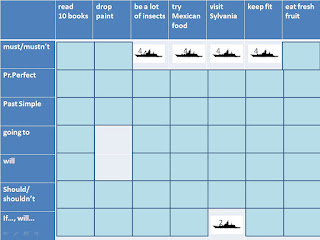Microsoft PowerPoint can work perfectly not only for creating presentations, but also for making up animated activites for the lesson. In this post you will learn how to make games in this programme.
At the lesson you will need a projector and an interactive board.
SHARE WITH YOUR FRIENDS
At the lesson you will need a projector and an interactive board.
- Sea battles. A well-known game from our childhood can be used to practice speaking skills and revising grammatical structures. I used this one at the end of the school year (New Hot Spot 3). Students have to make a sentence using the suggested structure and the expression. If the sentence is correct, then you click on the field and check wether there is a battleship. Here you can download my presentation and transform it according to your needs.-->A sea battle game



